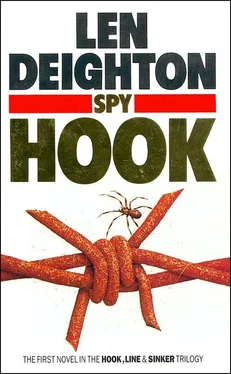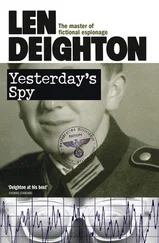Len Deighton - Spy Hook
Здесь есть возможность читать онлайн «Len Deighton - Spy Hook» — ознакомительный отрывок электронной книги совершенно бесплатно, а после прочтения отрывка купить полную версию. В некоторых случаях можно слушать аудио, скачать через торрент в формате fb2 и присутствует краткое содержание. Жанр: Триллер, на английском языке. Описание произведения, (предисловие) а так же отзывы посетителей доступны на портале библиотеки ЛибКат.
- Название:Spy Hook
- Автор:
- Жанр:
- Год:неизвестен
- ISBN:нет данных
- Рейтинг книги:4 / 5. Голосов: 1
-
Избранное:Добавить в избранное
- Отзывы:
-
Ваша оценка:
- 80
- 1
- 2
- 3
- 4
- 5
Spy Hook: краткое содержание, описание и аннотация
Предлагаем к чтению аннотацию, описание, краткое содержание или предисловие (зависит от того, что написал сам автор книги «Spy Hook»). Если вы не нашли необходимую информацию о книге — напишите в комментариях, мы постараемся отыскать её.
Spy Hook — читать онлайн ознакомительный отрывок
Ниже представлен текст книги, разбитый по страницам. Система сохранения места последней прочитанной страницы, позволяет с удобством читать онлайн бесплатно книгу «Spy Hook», без необходимости каждый раз заново искать на чём Вы остановились. Поставьте закладку, и сможете в любой момент перейти на страницу, на которой закончили чтение.
Интервал:
Закладка:
'Yes,' I said. Who could forget it: a huge horrid thing with angels and dragons and horses and goodness knows what else jumping about all over the mantelshelf. And if you missed seeing it, there was every chance that it's resonant chimes would keep you awake all night. But I could see a complication just the same; Lisl had often expressed her fondness for that dreadful object.
'And some other oddments. Photos of my parents, a tiny embroidered cushion I had when I was a little girl. Some papers, keepsakes, diaries, letters and things that belonged to my husband. I'll send Ingrid to Berlin to get them. It would be tragic if they were thrown away.'
'Nothing will happen as quickly as that,' I said. I was fearful that she'd phone Lisl before Werner had spoken to her. Then there would be a fearful rumpus.
'Just private papers,' she said. 'Things that are of no concern to anyone but me.' She nodded. 'Ingrid will find them for me. Then Lisl can have the house.' She looked down at her hands and became aware of the photo she was holding. She passed it to me. 'My wedding,' she announced.
I looked at it. It had been an elaborate ceremony. She was standing on the steps of some grand building in a magnificent wedding gown – there were pages behind her to hold the train of it – and her husband was in the dress uniform of some smart Prussian regiment. Deployed on the higher steps there was a sword-brandishing honour guard of army officers, each one accompanied by a bridesmaid in the old German style. On each side the guests were arrayed: a handsome naval officer, high-ranking Brownshirts and SS officers, richly caparisoned Nazi party officials and other elaborate uniforms of obscure Nazi organizations.
'Do you see Lisl there?' she said with an arch smile.
'No.'
'She's with the civilian.' It was easy to spot them now; he was virtually the only man there without uniform. 'Poor Erich,' she said and gave a snigger of laughter. Once no doubt this cruel joke against Lisl's piano player husband had been a telling blow. But this old woman didn't seem to realize that history had decided in Erich Hennig's favour.
I slid the photo back into its narrow allotment of space on the table.
'Just private papers,' she said again. 'Things that are of no concern to anyone but me.'
Promptly at one o'clock her daughter called us for lunch in the small dining room which looked on to the courtyard. The old woman walked there, slowly but without assistance, and continued to talk all through the meal. It was always about Berlin.
'I know Berlin not at all,' said Ingrid, 'but for my mother there is no other town like it.'
It was enough to start another story about her happy prewar days in the capital. Sometimes the old woman's stories were told with such gusto that she seemed to forget that I was there with her daughter. She seemed to be speaking to other people and she larded her stories with '…and you remember that stuff that Fritz liked to drink…' or '… that table that Pauli and I always reserved at the Königin on Ku-Damm…' Once in the middle of a story about the gala ball she'd attended in 1938, she said to Ingrid, 'What was the name of that place where Göring had that wonderful ball?'
'Haus der Flieger,' said Ingrid. I must have looked puzzled for she added, 'I know all Mama's stories very well by now, Herr Samson.'
After lunch her mother quietened. Ingrid said, 'My mother gets tired. I think she should have a little sleep now.'
'Of course. Can I help?'
'She likes to walk on her own. I think she's all right.' I waited while Ingrid took her mother to her room again. There was still another quarter of an hour before Gloria was due to collect me so Ingrid invited me to sit in the kitchen and share a second pot of coffee she was just about to make for herself. I accepted.
Ingrid Winter seemed a pleasant woman, who waved away my suggestions that forgoing a share in the house was a generous thing to do. 'When Mama dies, and Tante Lisl dies,' she said, not using any of the common euphemisms for death, 'I will have no use for a house in Berlin.'
'You prefer France?' I asked.
She looked at me for a moment before answering. 'Mama likes the climate.' There was no indication about her own likes and dislikes.
'Most people do,' I said.
She didn't respond. She poured more coffee for me and said, 'You mustn't take any notice of what Mama says.'
'She's a wonderful old woman considering her age.'
'That may be true but she is mischievous: old people often like to make trouble. They are like children in that respect.'
'I see,' I said and hoped she would explain.
'She tells lies.' Perhaps seeing that these allegations had little effect upon me she became more specific. 'She pretends to believe everything but her brain works like lightning. She pretends to believe that you're a writer but she knows who you are.' She waited.
'Does she?' I said in a bored voice and sipped some coffee.
'She knew before you arrived. She knew your father a long time ago: before the war she said it was. She told me your father was an English spy. She says you're probably a spy too.'
'She is a very old woman.'
'Mama said your father killed her husband.'
'She said that?'
'In those very words. She said, "This man's father killed my darling husband" and said I must be on my guard against you.'
'You've been very frank, Fräulein Winter, and I appreciate it, but I truly can't fathom what your mother was referring to. My father was a British army officer but he was not a fighting soldier. He was stationed in Berlin after the war, she might have met him then. Before the war he was a travelling salesman. It seems very unlikely that she could have met him before the war.'
Ingrid Winter shrugged. She was not going to vouch for the accuracy of anything her mother said.
There was a peremptory toot on a car horn and I got up to go. When Ingrid Winter handed me my coat we were back to discussing the vagaries of the weather again. As I said goodbye to her I found myself wondering why her mother might have said 'killed my darling husband' rather than 'killed your father'. I didn't know much about Inge Winter's husband except what I'd heard from Lisl; that Paul Winter had been some kind of civil servant working in one of the Berlin ministries, and that he'd died somewhere in southern Germany in the aftermath of the war. Now that I'd met Ingrid – this woman of whom her aunt Lisl knew nothing – I could only say that there were a lot of things about the Winter family that I didn't understand, including what my father might have had to do with them.
9
We spent the last evening of that hectic weekend in Provence at the nearby home of Gloria's 'uncle'. Gloria's parents were Hungarian; and this old friend wasn't actually a kinsman, except in the way that all Hungarian exiles are a family of crazy, congenial, exasperating individuals who, no matter how reclusive their mode of living, keep amazingly well informed about the activities of their 'relatives'.
Zu he called her. All her Hungarian friends called her Zu. It was short for Zsuzsa, the name she'd been given by her parents. This 'Dodo' lived in an isolated tumbledown cottage. It was on a hillside, sandwiched between a minuscule vineyard and the weed-infested ground of an abandoned olive oil mill. One small section of earth had been partitioned off to be Dodo's garden, where the remaining leaves of last year's winter vegetables were being devoured by slugs. Perched precariously over a drainage ditch at the front there was a battered Deux Chevaux with one headlight missing.
He was introduced to me as 'Dodo', and judging by the vigorous way he shook my hand was happy enough to be called that. My first impression was of a man in his middle sixties, a short fat noisy fellow who any casting director would engage to play the role of a lovable Hungarian refugee. He had a lot of pure white hair that was brushed straight back, and a large unruly moustache that was somewhat greyer. His face was ruddy, the result perhaps of his drinking, for the whole house was littered with bottles, both full and empty, and he seemed quite merry by the time we arrived. To what extent his imbibing advanced his linguistic ability I'm not sure but his English was almost accentless and fluent, and – apart from a tendency to call everyone 'darling' – his syntax had only the imperfections of the natives.
Читать дальшеИнтервал:
Закладка:
Похожие книги на «Spy Hook»
Представляем Вашему вниманию похожие книги на «Spy Hook» списком для выбора. Мы отобрали схожую по названию и смыслу литературу в надежде предоставить читателям больше вариантов отыскать новые, интересные, ещё непрочитанные произведения.
Обсуждение, отзывы о книге «Spy Hook» и просто собственные мнения читателей. Оставьте ваши комментарии, напишите, что Вы думаете о произведении, его смысле или главных героях. Укажите что конкретно понравилось, а что нет, и почему Вы так считаете.












